2017年高考二轮语法专题课件:动词的时态和语态
文档属性
| 名称 | 2017年高考二轮语法专题课件:动词的时态和语态 |

|
|
| 格式 | zip | ||
| 文件大小 | 194.0KB | ||
| 资源类型 | 教案 | ||
| 版本资源 | 通用版 | ||
| 科目 | 英语 | ||
| 更新时间 | 2017-01-18 00:00:00 | ||
图片预览

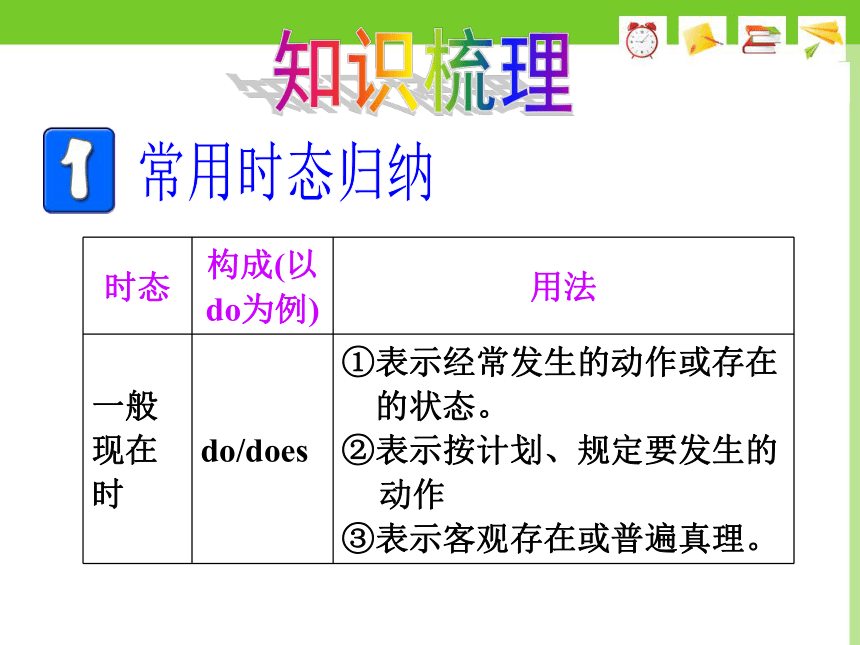
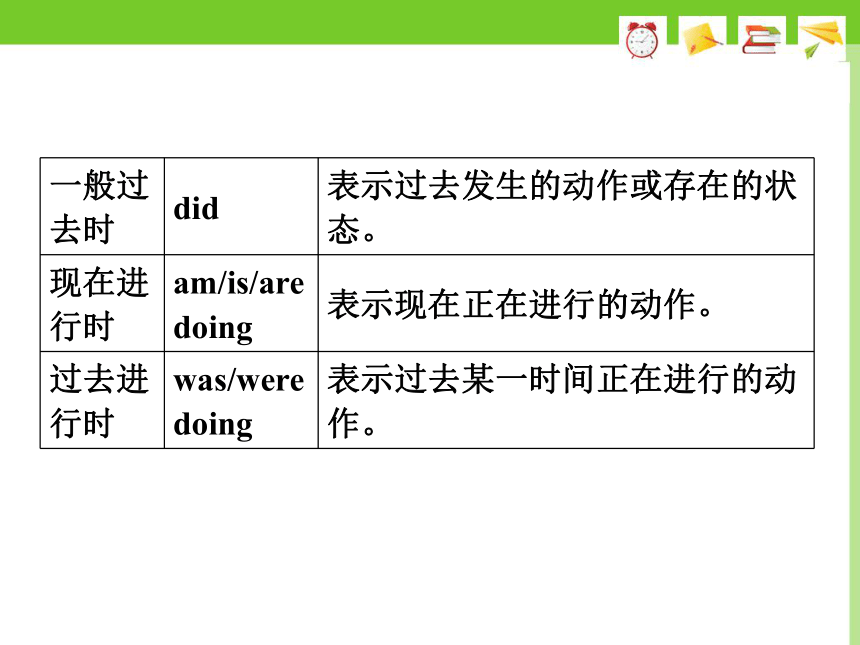

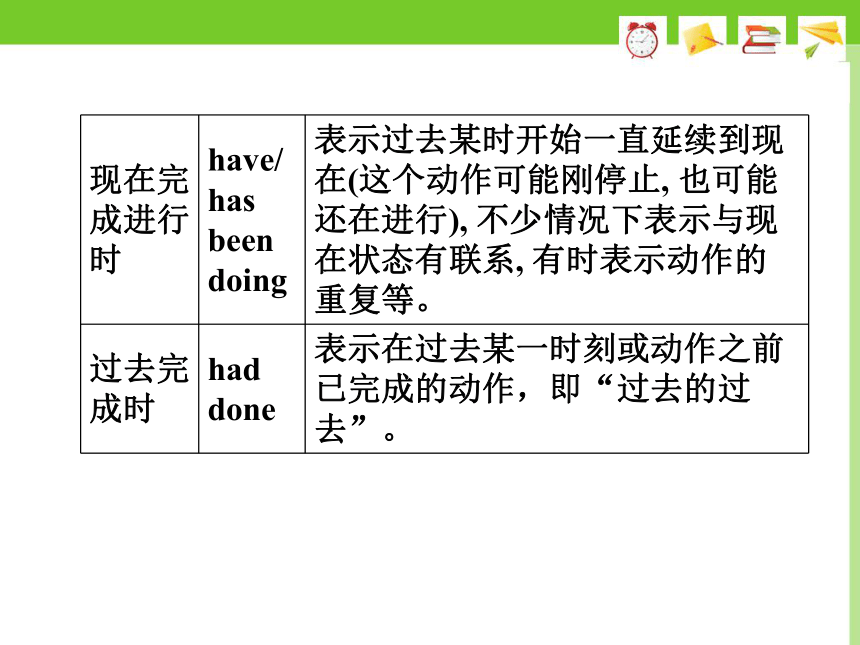
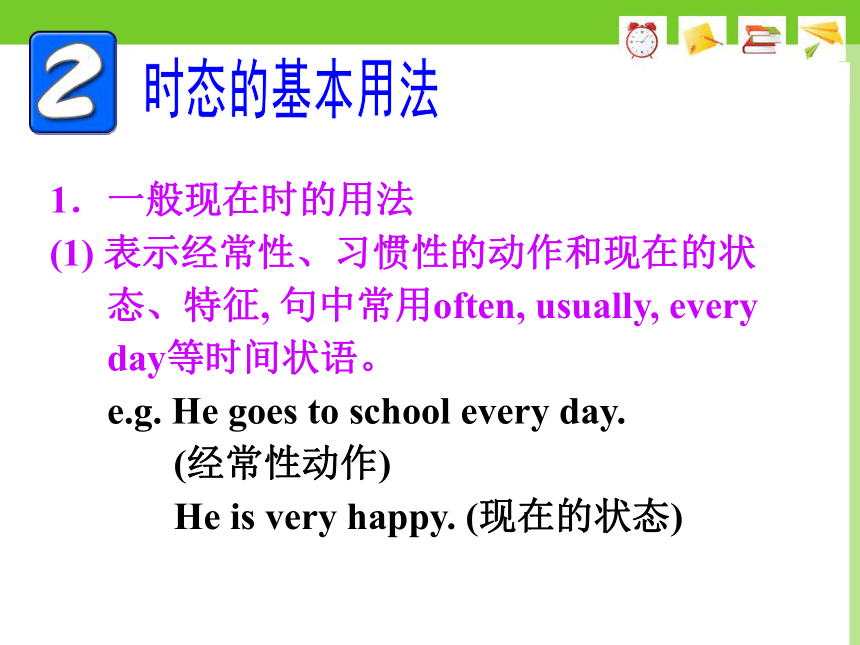
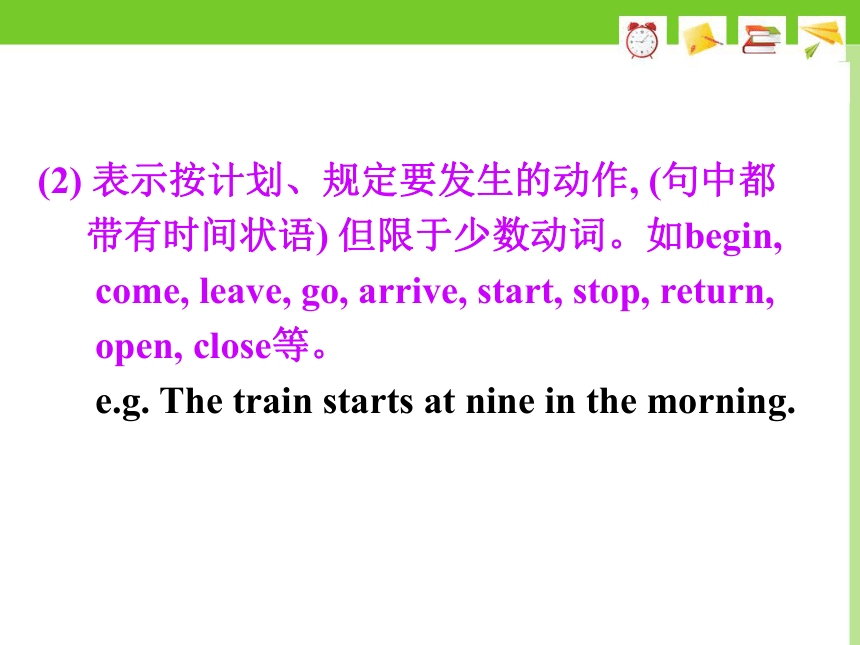
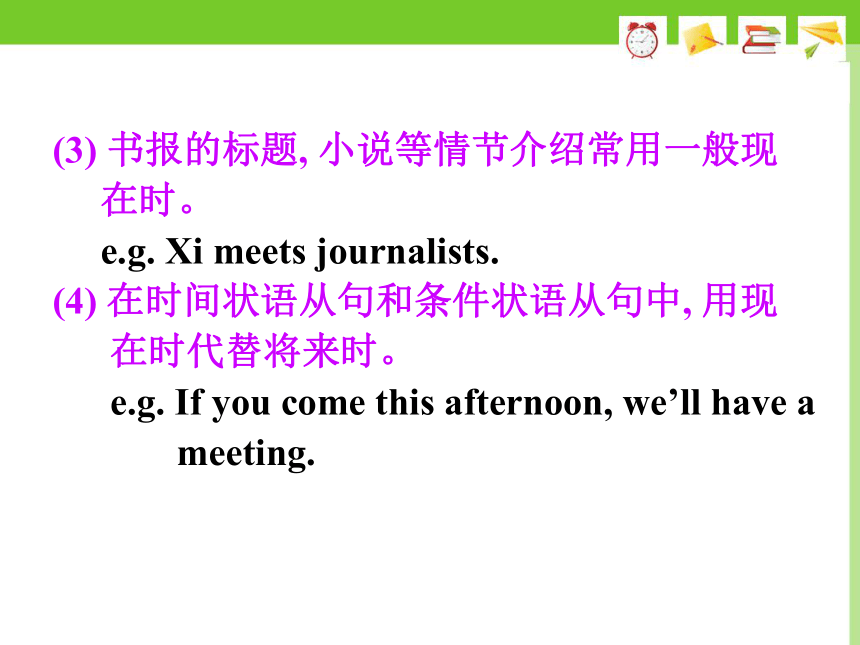
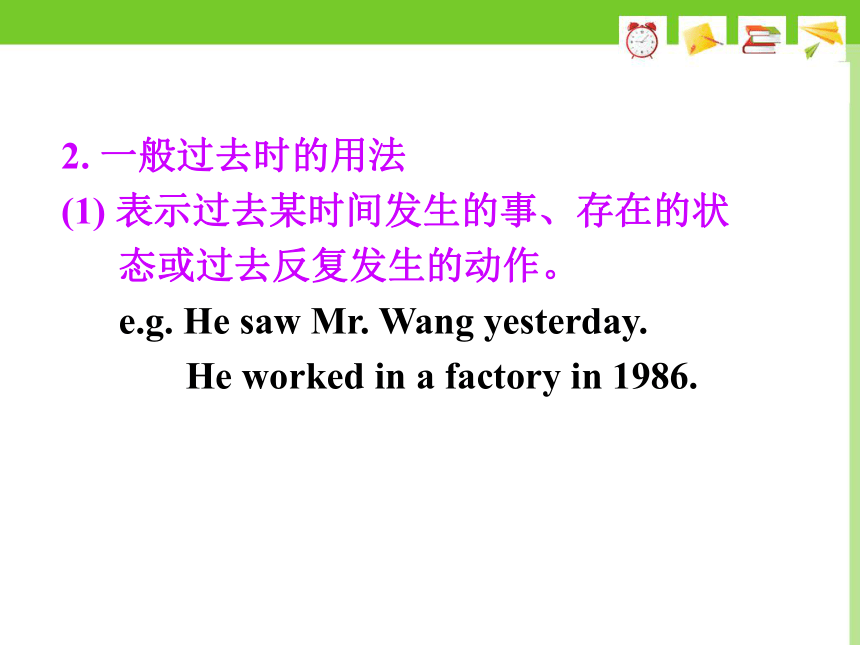
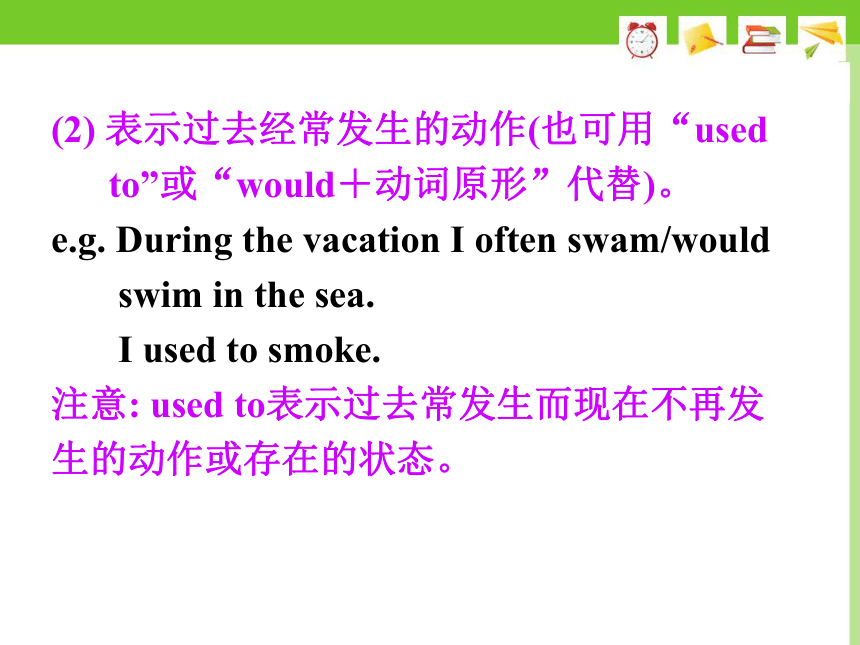
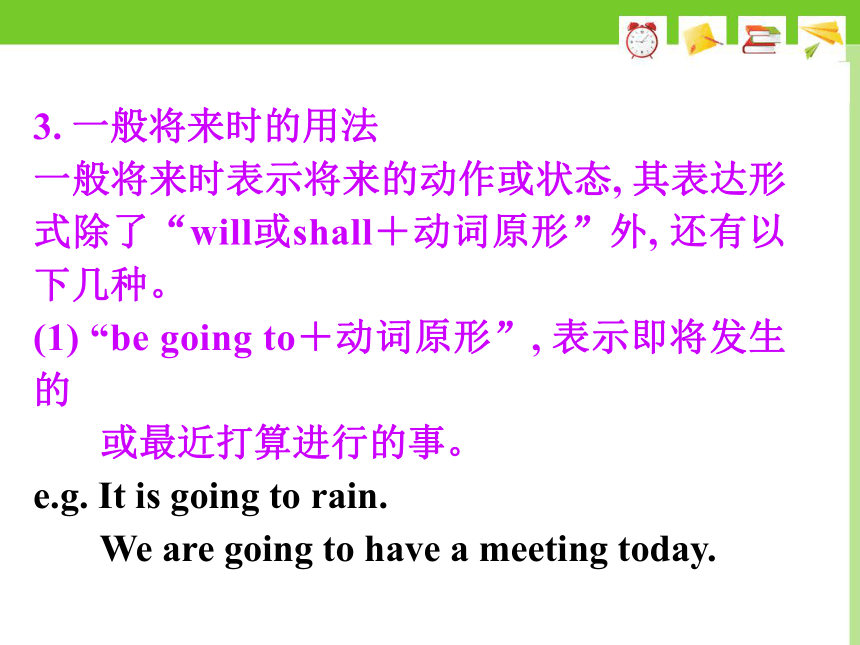
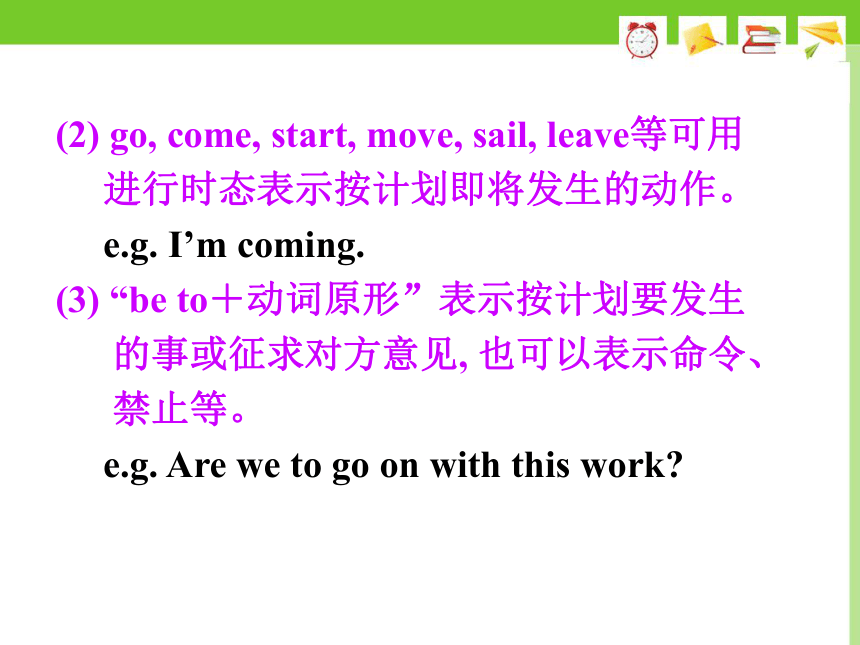
文档简介
课件67张PPT。动词的时态和语态知识梳理常用时态归纳1.一般现在时的用法
(1) 表示经常性、习惯性的动作和现在的状
态、特征, 句中常用often, usually, every
day等时间状语。
e.g. He goes to school every day.
(经常性动作)
He is very happy. (现在的状态)时态的基本用法(2) 表示按计划、规定要发生的动作, (句中都
带有时间状语) 但限于少数动词。如begin,
come, leave, go, arrive, start, stop, return,
open, close等。
e.g. The train starts at nine in the morning.(3) 书报的标题, 小说等情节介绍常用一般现
在时。
e.g. Xi meets journalists.
(4) 在时间状语从句和条件状语从句中, 用现
在时代替将来时。
e.g. If you come this afternoon, we’ll have a
meeting.2. 一般过去时的用法
(1) 表示过去某时间发生的事、存在的状
态或过去反复发生的动作。
e.g. He saw Mr. Wang yesterday.
He worked in a factory in 1986.(2) 表示过去经常发生的动作(也可用“used
to”或“would+动词原形”代替)。
e.g. During the vacation I often swam/would
swim in the sea.
I used to smoke.
注意: used to表示过去常发生而现在不再发生的动作或存在的状态。3. 一般将来时的用法
一般将来时表示将来的动作或状态, 其表达形式除了“will或shall+动词原形”外, 还有以下几种。
(1) “be going to+动词原形”, 表示即将发生的
或最近打算进行的事。
e.g. It is going to rain.
We are going to have a meeting today.(2) go, come, start, move, sail, leave等可用
进行时态表示按计划即将发生的动作。
e.g. I’m coming.
(3) “be to+动词原形”表示按计划要发生
的事或征求对方意见, 也可以表示命令、
禁止等。
e.g. Are we to go on with this work?(4) “be about to+动词原形”表示即将发生
的动作。
e.g. The plane is about to leave.
(5) 某些表示位移、停留等的动词其现在
进行时可表示按计划或不久之后肯定
发生的动作或将要做的事。这类动词
有go, come, stay, leave, start等。4. 现在进行时的用法
(1) 表示此时此刻正在进行的动作, 由“be+现
在分词”构成。
e.g. What are you doing?
(2) 与always, constantly等连用, 表示感
彩。
e.g. He is always helping others. 另外“系动词+介词或副词”也表示进行时的意义。
e.g. The bridge is under construction. 注意:下列动词不宜用进行时
① 感觉类:look, smell, feel, sound, taste, see,
hear等;
② 感情类:like, love, prefer, admire, hate,
fear等;
③ 所有类:have, contain, own, hold, belong
to等。5. 过去进行时的用法
(1) 表示过去某一时刻、某一阶段正进行的动
作, 由“was (were)+现在分词”构成。
e.g. He was reading a novel when I came in.
(2) 与always, forever, constantly连用, 表示赞
成或厌恶的感彩。
e.g. He was always thinking of others, never
thinking of himself.6. 现在完成时的用法
现在完成时由“have+过去分词”构成。其使用有两种情况:
(1) 表示的动作在说话之前已完成, 而对现在有影响, 句中没有具体时间状语。
e.g. He has gone to Fuzhou. (说话人认为他
不在此地)
He has been to Fuzhou. (说话人认为他
在此地)(2) 现在完成时所表示的动作开始于过去, 持
续到现在, 也许还会持续下去。常与for...
和since...等表示一段时间的状语或so far
等表示包括现在时间在内的状语连用。
e.g. He has studied English for 5 years.
He has studied English since 1985.
注意: 表示短暂时间动作的词, 如come, go, die, marry, buy等的完成时不能与for, since等表示一段时间的词连用。(3) 还可用在时间和条件状语从句中, 表示将来
某时完成的动作, 强调此动作先于主句动作
发生。
e.g. I’ll go to your home when I have finished
my homework.
Don’t get off the bus until it has stopped. 7. 过去完成时的用法
(1) 表示过去某一时刻或某一动作之前完成
的动作或状态。句中常用by, before, until,
when等词引导的时间状语。
e.g. By the time he was twelve, Edison had
begun to make a living by himself.
I had learnt 5000 words before I entered
the university.(2) 表示过去某一时刻之前发生的动作或
状态持续到过去某个时间或持续下去。
e.g. Before he slept, he had worked for 12
hours.8. 过去将来时的用法
表示从过去的某时间看来将要发生的动作或存在的状态。由“should或would+动词原形”构成。第一人称用should, 其他人称用would。
e.g. They were sure that they would succeed.时态的比较
1. 一般过去时与现在完成时
一般过去时只表示过去的动作或状态,不涉及对现在的影响;现在完成时表示过去发生的某一动作对现在造成的影响或结果,强调的是现在的状况。如:
We stayed there two weeks.
The ship has sailed for two weeks.?
一般过去时和表示过去的时间状语连用;现在完成时常和一些不明确的或包括“现在”在内的时间状语或表示从过去某一时刻延续到现在的“一段时间”的状语连用,而不与明确的、具体的过去时间状语连用。如:
Tom suddenly fell ill yesterday.
It has been freezing cold since last week.
2. 过去完成时与一般过去时
过去完成时以过去某时间为起点,表示过去某一时间或动作之前已经发生或完成的动作或存在的状态;一般过去时以现在时间为起点,表示过去发生的动作或存在的状态。如:
He told me that he had seen the film the day before.
He died three years ago.表示某事继续到过去某时已有一段时间时,用过去完成时;表示两个或两个以上的动作,用and (then), then或but等连接,按照动作发生的顺序表达时,用一般过去时。如:
He said he had worked in that factory since 1984.
He had lunch and then continued his work.
3. 现在完成时与现在完成进行时
在表示“未完成”且与“一段时间”连用时,两者可互换。如:
We have lived / have been living here for two years.在没有表示“一段时间”的状语时,现在完成进行时强调继续进行,表示“未完成”,而现在完成时强调结果,表示完成。如:
I have been reading.
He has turned off the light.时态的呼应
1. 主句谓语是现在或将来时态,从句谓语可
用任何所需要的时态。
2. 主句谓语是过去时态:
1)如从句谓语动作与主句谓语动作同时发生,从句谓语常用一般过去时或过去进行时。如:
I was walking in the street when I met an old friend of mine.
While we were having breakfast, John was talking on the phone.2)如从句谓语动作发生在主句谓语动作之前,从句谓语用过去完成时。如:
I didn’t know I had given you so much trouble.
3)如从句谓语动作发生在主句谓语动作之后,从句谓语用过去将来时。如:
My coach told me that I would succeed.
4)如从句表示的是真理、规律或事实,从句谓语用一般现在时。如:
The teacher said the polar ice melts each summer. 英语的语态分为主动语态和被动语态。主动语态表示主语是动作的执行者, 被动语态表示主语是动作的承受者。只有及物动词或含及物意义的短语动词才能转换成被动语态。动词的被动语态一、被动语态的用法:
?????? 当我们不知道谁是动作的执行者,或者没有必要指出谁是动作的执行者,或者只需强调动作的承受者时,要用被动语态。
e.g. Such books are written for middle school
students.
?????? English is spoken in many countries.二、被动语态的构成:
被动语态是由“助动词be +及物动词的过去分词”构成,be随主语的人称、数和时态的变化而变化。被动语态可以用于各种时态。1. 几种形式的被动语态(以动词give为例)
一般现在时am/is/are +及物动词的过去分词
一般过去时was/were +及物动词的过去分词
一般将来时shall/will/ be going to + be +及物动词的过去分词
一般过去将来时should/would be +及物动词的过去分词
现在进行时am/is/are being +及物动词的过去分词
过去进行时was/were being +及物动词的过去分词
现在完成时has/have been +及物动词的过去分词
过去完成时had been +及物动词的过去分词
将来完成时shall/will have been +及物动词的过去分词
过去将来完成时should/would have been +及物动词的过去分词 2. 特殊结构的被动形式
(1) 双宾动词的被动结构
双宾动词变为被动结构时, 一般将主动结构中的间接宾语变为被动结构中的主语, 直接宾语不变。如将主动结构中的直接宾语变为被动结构中的主语, 间接宾语之前则应加介词to或for。
(2) 带复合宾语的动词的被动结构
带复合宾语的动词变被动语态时, 一般将主动结构中的宾语变为被动结构中的主语, 而将宾语补足语保留不动(这时的宾语补足语为主语补足语)。(3) 带情态动词的被动语态,由“情态动词
+be+及物动词的过去分词”构成。
e.g. The problem may be solved in a number of
different ways.
In our school, library books must be
returned in two weeks.(4)“be+过去分词+不定式”式的被动结构
e.g. He is reported to have broken a world
record.
She is said to know three languages.(5) “it+be+过去分词+从句”式的被动结构 e.g. It’s said that she has some supernatural
powers.
It’s reported that they have discovered a
new star.
常见的结构还有:
It is known that...众所周知
It is suggested that...有人建议
It is believed that...人们相信(6) “get+done”构成被动语态
此种形式用来表示状态或情况, 常考的形式如下:
get married 结婚;get engaged 订婚;
get hurt/wounded 受伤;get lost 迷路;
get drunk 喝醉了;
get caught/stuck/trapped 被困;
get dressed 穿好衣服;
get run over 被(车)轧等。3. 主动形式表示被动意义
★一些感官动词,如feel, sound, smell, look,
taste等用作系动词时。如:
It tastes strongly of mint.
★说明主语的性质、特点的动词,如read,
write, cut, sell, wash, wear, lock等,其主语往
往是物。如:
The pen he bought yesterday writes smoothly.
★在“be +形容词+不定式”结构中,不定式与句
子的主语有逻辑上的动宾关系时。用于此结
构的形容词常见的有:difficult, hard, easy,
light, heavy, expensive, cheap, pleasant, interesting, fit, comfortable等。如:
The man is very easy to get along with.
★当want, need, require表示“需要”时,其宾语
用动词-ing形式的主动形式表示被动意义。
如:
The house his grandmother lives in needs
repairing.
★在be (well) worth doing, be to blame中。如:
The book he borrowed from the library
yesterday is well worth reading.★在have, find, lend, give等动词后的宾语有不
定式作定语,不定式与宾语是逻辑上的动宾
关系,但是在句子中又有不定式动作的执行
者时。如:
He has found nothing to eat since he left home
and came into the forest.4. 不能用于被动语态的情况
★谓语是及物动词leave, enter, reach, suit,
benefit, lack等。
★谓语是不可拆开的take place, consist of,
lose heart, belong to等短语动词。
★宾语是无实意的代词it。
★宾语是表示身体的某一部分的名词。
★宾语是某些抽象名词。
★have不论在什么情况下都不能用于被动语
态。★一般来说,当动词的宾语是动词-ing形式或
者是不定式时不能变成被动语态。
★将来进行时和完成进行时没有被动语态。
如果遇到这种情况时,可以用一般将来时
和现在完成时的被动语态来代替。1.【2015·北京】22. — Did you enjoy the party?
— Yes, we ___ by our hosts.
A. were treated B. would be treated.
C. treated D. had treated
2.【2015·北京】26. In the last few years,
China ___ great achievements in
environmental protection.
A. has made B. had made
C. was making D. is making真题再现3.【2015·北京】27. —Did you have difficulty
finding Ann’ house?
—Not really. She ___ us clear directions
and we were able to find it easily.
A. was to give B. had given
C. was giving D. would give
4.【2015·北京】30. —Dr. Jackson is not in his
office at the moment.
—All right. I ____ him later.
A. will call B. have called
C. call D will be calling5.【2015·重庆】1. —Is Peter coming?
—No, he ____ his mind after a phone call at
the last minute.
A. changes B. changed
C. was changing D. had changed
【解析】
试题分析:句意:彼得来了吗?没有,刚才接
到一个电话后改变主意了。根据at the last
minute在最后一秒可能发生在过去,故用一般
过去时。 6.【2015·重庆】13. In my hometown, there
is always a harvest supper for the
farmers after all the wheat ____ cut.
A. will have been B. will be
C. was D. has been
7.【2015·浙江】8. Albert Einstein was born
in 1879. As a child, few people guessed
that he _____ a famous scientist whose
theories would change the world.
A. has been B. had been
C. was going to be D. was8.【2015·天津】9. Despite the previous
rounds of talks, no agreement ______ so
far by the two sides.
A. has been reached B. was reached
C. will reach D. will have reached
【解析】
试题分析:句意:尽管之前多轮谈判,但到目前为止双方没有达成任何协议。根据句中的时间状语so far“到目前为止”可知用现在完成时。主语agreement与reach为被动关系,根据句意可知选A。9.【2015·天津】6. Jane can’t attend the
meeting at 3 o’clock this afternoon
because she ______ a class at that time.
A. will teach B. would teach
C. has taught D. will be teaching
10.【2015·四川】4. More expressways ______
in Sichuan soon to promote the local
economy.
A. are being built B. will be built
C. have been built D. had been built11.【2015·陕西】24. At college, Barack
Obama didn’t know that he ______ the first
black president of the United States of
America.
A. was to become B. becomes
C. is to become D. became 12.【2015·陕西】22. Marty ______ really hard
on his book and thinks he’ll have finished it
by Friday.
A. worked B. has been working
C. had worked D. has worked
【解析】
试题分析:句意:Marty一直努力写书,我想他到周五为止将已经完成了。用现在完成进行时表示从过去到现在一直进行的动作。所以选B。13.【2015·福建】30. —Where is Peter? I can’t
find him anywhere.
—He went to the library after breakfast
and _____ his essay there ever since.
A. wrote B. had written
C. has been writing D. is writing
14.【2015·福建】26. To my delight, I ____
from hundreds of applicants to attend the
opening ceremony.
A. was chosen B. was being chosen
C. would choose D. had chosen15.【2015·江苏】30. The real reason why
prices ____, and still are, too high is
complex, and no short discussion can
satisfactorily explain this problem.
A. were B. will be
C. have been D. had been
【解析】
试题分析:句意:过去和现在价格一直居高不下的真正原因很复杂,简短的讨论解释这一问题无法让人满意。根据题干中“and still are”的提示可知过去价格也居高不下,故用一般过去时,表示过去的状态。故选A项。16.【2015·安徽】29. It is reported that a space
station ______ on the moon in years to come.
A. will be building B. will be built
C. has been building D. has been built
17.【2015·安徽】24. Just as I got to the school
gate, I realised I ______ my book in the cafe.
A. have left B. had left
C. would leave D. was leaving18.【2015·湖南】28. He must have sensed that
I ________ him. He suddenly glanced at
me and said quietly, “Why are you staring
at me like that?”
A. would look at B. looked at
C. was looking at D. am looking at
19.【2015·湖南】25. I wasn’t able to hide my
eagerness when I ________, “What do you
wish me to do now?”
A. ask B. have asked C. am asking D. asked20.【2015·湖南】22. As you go through this
book, you ________ that each of the
millions of people who lived through World
War II had a different experience.
A. will find B. found C. had found D. have found
【解析】
试题分析:一般将来时表示将要发生的动作或情况。在一般将来时的句子中,有时有表示将来时间的状语,有时没有时间状语,这时要从意思上判断是否指未来的动作或情况。句意:当你通读这本书的时候,你将会发现成千上万的经历过二战的每个人都有不同的经历。根据句意,判断主语的时态为一般将来时,故选A。21.【2015·湖南】35. That’s why I help brighten
people’s days. If you ________, who’s to say
that another person will?
A. didn’t B. don’t C. weren’t D. haven’t
【解析】
考查动词的时态。根据主句中another person will可知,此处隐含将来的动作,但是条件状语从句中通常用现在时表示将来的动作。故选B。句意: 这就是我为什么为别人的生活增添乐趣。如果你不这样做的话,天知道还会有谁做。22.【2015·湖南】32. I had a strong desire to reach in and play with the toy, but ________ thankfully by the shop window.
A. am held back B. held back
C. hold back D. was held back巩固练习I. 用括号内单词或短语的正确形式填空。
1. By next Saturday, I ___________________
(work) on this painting for exactly one month.
2. We _______________ (look for) her ring for
two hours when we found it in the bathroom.
3. Drivers _____________ (make) to drive more
carefully after the stricter traffic law takes
effect.
4. Hardly had the minister finished his speech
when gunmen ________ (storm) the stadium.will be made ? ? ? will have been workinghad looked forstormed5. Everybody will be at the office at about 8:30
tomorrow as the meeting ________ (start) at
nine o’clock.
6. That candidate who I had interviewed before
I ________ (speak) to all the others is still my
favorite.
7. The chairman was sure that his plan would
work out fine as no other member
_____________ (oppose) it up to that time.
8. If Diana saw a big spider, she _____________
(scream) like crazy.starts?? spokehad opposed ? ? ? ? ? would scream9. By the year 2020, the Indo-European
language family ___________________ (study)
for more than 200 years.
10. The car couldn’t be used because it
____________________ (service).will have been studiedwas being servicedII. 用括号内动词的正确形式完成下面短文。
A
Right now, Jim 1. ___________ (read) the newspaper and Kathy 2. ___________ (make) dinner. Last night at this time, they 3. ___________ (do) the same thing. She 4. _____________ (cook) and he 5. ___________ (read) the newspaper. Tomorrow at this time, they 6. ____________ (do) the same thing. She 7. ________________ (prepare) dinner and
he 8. _______________ (read). They are
very predictable people! is readingis makingwere doingwas cookingwas readingwill be doingwill be preparingwill be readingB
We 1. ________ (have) to go to the pharmacy (药房) late last night when my child 2. ________ (become) sick. The pharmacist 3. ________ (leave) for home by the time we 4. ________ (get) there. By the time we 5. _________ (return) home, the baby’s fever 6. _________ (go) down. Next time the baby 7. _____ (have) a fever, we 8. ________ (be) better prepared.hadbecamehad left ? got ? ? ?? returned? ? ?? had gone? ?? has ? ?? will be ? ? ?? C
“Today is going to be very cold,” said the weather man on TV. “You need to wear very warm clothes.”
He 1. _______ (talk) in a very low voice. He was being very serious. “You need to be careful out on the roads,” he said. “Two car accidents 2. _________________ (report) this morning.”
Dr. Hayden 3. _______ (turn) off the TV. He put on the warmest clothes he had. Then,
he 4. _____ (go) outside. It was snowing
and the wind 5. _____________ (blow). talkedwent? have been reportedturnedwas blowing? “Wow, it is very cold outside,” said Dr. Hayden. The weather man 6. _____ (be) right! He got into his car. He turned the key. The engine 7. _____ (come) to life. He turned up the heat. He was very cold.
There was a lot of traffic on the road. The cars 8. ____ (go) slow. The doctor did not understand why everybody was going so slow. “Why are all the cars going so slow today?” he said. “They aren’t going as fast as usual. Usually they go faster.”wascamewent He began to think to himself, “If it 9. ________ (take) me ten more minutes to get to work, then this 10. ______________ (be) the longest drive to work I have ever taken!”
Finally, he 11. _____ (see) why the cars were going so slow — there was a car accident!
“Why did this accident happen?” Dr. Hayden said. He 12. ______ (drive) closer to the accident. He looked out of his window.
“Is everybody okay here?” he asked.
“Yes. We 13. ____ (have) a small car
accident, but we 14. ___ (be) okay,” they said.takeswill have beensawdrove?? had?? are??
(1) 表示经常性、习惯性的动作和现在的状
态、特征, 句中常用often, usually, every
day等时间状语。
e.g. He goes to school every day.
(经常性动作)
He is very happy. (现在的状态)时态的基本用法(2) 表示按计划、规定要发生的动作, (句中都
带有时间状语) 但限于少数动词。如begin,
come, leave, go, arrive, start, stop, return,
open, close等。
e.g. The train starts at nine in the morning.(3) 书报的标题, 小说等情节介绍常用一般现
在时。
e.g. Xi meets journalists.
(4) 在时间状语从句和条件状语从句中, 用现
在时代替将来时。
e.g. If you come this afternoon, we’ll have a
meeting.2. 一般过去时的用法
(1) 表示过去某时间发生的事、存在的状
态或过去反复发生的动作。
e.g. He saw Mr. Wang yesterday.
He worked in a factory in 1986.(2) 表示过去经常发生的动作(也可用“used
to”或“would+动词原形”代替)。
e.g. During the vacation I often swam/would
swim in the sea.
I used to smoke.
注意: used to表示过去常发生而现在不再发生的动作或存在的状态。3. 一般将来时的用法
一般将来时表示将来的动作或状态, 其表达形式除了“will或shall+动词原形”外, 还有以下几种。
(1) “be going to+动词原形”, 表示即将发生的
或最近打算进行的事。
e.g. It is going to rain.
We are going to have a meeting today.(2) go, come, start, move, sail, leave等可用
进行时态表示按计划即将发生的动作。
e.g. I’m coming.
(3) “be to+动词原形”表示按计划要发生
的事或征求对方意见, 也可以表示命令、
禁止等。
e.g. Are we to go on with this work?(4) “be about to+动词原形”表示即将发生
的动作。
e.g. The plane is about to leave.
(5) 某些表示位移、停留等的动词其现在
进行时可表示按计划或不久之后肯定
发生的动作或将要做的事。这类动词
有go, come, stay, leave, start等。4. 现在进行时的用法
(1) 表示此时此刻正在进行的动作, 由“be+现
在分词”构成。
e.g. What are you doing?
(2) 与always, constantly等连用, 表示感
彩。
e.g. He is always helping others. 另外“系动词+介词或副词”也表示进行时的意义。
e.g. The bridge is under construction. 注意:下列动词不宜用进行时
① 感觉类:look, smell, feel, sound, taste, see,
hear等;
② 感情类:like, love, prefer, admire, hate,
fear等;
③ 所有类:have, contain, own, hold, belong
to等。5. 过去进行时的用法
(1) 表示过去某一时刻、某一阶段正进行的动
作, 由“was (were)+现在分词”构成。
e.g. He was reading a novel when I came in.
(2) 与always, forever, constantly连用, 表示赞
成或厌恶的感彩。
e.g. He was always thinking of others, never
thinking of himself.6. 现在完成时的用法
现在完成时由“have+过去分词”构成。其使用有两种情况:
(1) 表示的动作在说话之前已完成, 而对现在有影响, 句中没有具体时间状语。
e.g. He has gone to Fuzhou. (说话人认为他
不在此地)
He has been to Fuzhou. (说话人认为他
在此地)(2) 现在完成时所表示的动作开始于过去, 持
续到现在, 也许还会持续下去。常与for...
和since...等表示一段时间的状语或so far
等表示包括现在时间在内的状语连用。
e.g. He has studied English for 5 years.
He has studied English since 1985.
注意: 表示短暂时间动作的词, 如come, go, die, marry, buy等的完成时不能与for, since等表示一段时间的词连用。(3) 还可用在时间和条件状语从句中, 表示将来
某时完成的动作, 强调此动作先于主句动作
发生。
e.g. I’ll go to your home when I have finished
my homework.
Don’t get off the bus until it has stopped. 7. 过去完成时的用法
(1) 表示过去某一时刻或某一动作之前完成
的动作或状态。句中常用by, before, until,
when等词引导的时间状语。
e.g. By the time he was twelve, Edison had
begun to make a living by himself.
I had learnt 5000 words before I entered
the university.(2) 表示过去某一时刻之前发生的动作或
状态持续到过去某个时间或持续下去。
e.g. Before he slept, he had worked for 12
hours.8. 过去将来时的用法
表示从过去的某时间看来将要发生的动作或存在的状态。由“should或would+动词原形”构成。第一人称用should, 其他人称用would。
e.g. They were sure that they would succeed.时态的比较
1. 一般过去时与现在完成时
一般过去时只表示过去的动作或状态,不涉及对现在的影响;现在完成时表示过去发生的某一动作对现在造成的影响或结果,强调的是现在的状况。如:
We stayed there two weeks.
The ship has sailed for two weeks.?
一般过去时和表示过去的时间状语连用;现在完成时常和一些不明确的或包括“现在”在内的时间状语或表示从过去某一时刻延续到现在的“一段时间”的状语连用,而不与明确的、具体的过去时间状语连用。如:
Tom suddenly fell ill yesterday.
It has been freezing cold since last week.
2. 过去完成时与一般过去时
过去完成时以过去某时间为起点,表示过去某一时间或动作之前已经发生或完成的动作或存在的状态;一般过去时以现在时间为起点,表示过去发生的动作或存在的状态。如:
He told me that he had seen the film the day before.
He died three years ago.表示某事继续到过去某时已有一段时间时,用过去完成时;表示两个或两个以上的动作,用and (then), then或but等连接,按照动作发生的顺序表达时,用一般过去时。如:
He said he had worked in that factory since 1984.
He had lunch and then continued his work.
3. 现在完成时与现在完成进行时
在表示“未完成”且与“一段时间”连用时,两者可互换。如:
We have lived / have been living here for two years.在没有表示“一段时间”的状语时,现在完成进行时强调继续进行,表示“未完成”,而现在完成时强调结果,表示完成。如:
I have been reading.
He has turned off the light.时态的呼应
1. 主句谓语是现在或将来时态,从句谓语可
用任何所需要的时态。
2. 主句谓语是过去时态:
1)如从句谓语动作与主句谓语动作同时发生,从句谓语常用一般过去时或过去进行时。如:
I was walking in the street when I met an old friend of mine.
While we were having breakfast, John was talking on the phone.2)如从句谓语动作发生在主句谓语动作之前,从句谓语用过去完成时。如:
I didn’t know I had given you so much trouble.
3)如从句谓语动作发生在主句谓语动作之后,从句谓语用过去将来时。如:
My coach told me that I would succeed.
4)如从句表示的是真理、规律或事实,从句谓语用一般现在时。如:
The teacher said the polar ice melts each summer. 英语的语态分为主动语态和被动语态。主动语态表示主语是动作的执行者, 被动语态表示主语是动作的承受者。只有及物动词或含及物意义的短语动词才能转换成被动语态。动词的被动语态一、被动语态的用法:
?????? 当我们不知道谁是动作的执行者,或者没有必要指出谁是动作的执行者,或者只需强调动作的承受者时,要用被动语态。
e.g. Such books are written for middle school
students.
?????? English is spoken in many countries.二、被动语态的构成:
被动语态是由“助动词be +及物动词的过去分词”构成,be随主语的人称、数和时态的变化而变化。被动语态可以用于各种时态。1. 几种形式的被动语态(以动词give为例)
一般现在时am/is/are +及物动词的过去分词
一般过去时was/were +及物动词的过去分词
一般将来时shall/will/ be going to + be +及物动词的过去分词
一般过去将来时should/would be +及物动词的过去分词
现在进行时am/is/are being +及物动词的过去分词
过去进行时was/were being +及物动词的过去分词
现在完成时has/have been +及物动词的过去分词
过去完成时had been +及物动词的过去分词
将来完成时shall/will have been +及物动词的过去分词
过去将来完成时should/would have been +及物动词的过去分词 2. 特殊结构的被动形式
(1) 双宾动词的被动结构
双宾动词变为被动结构时, 一般将主动结构中的间接宾语变为被动结构中的主语, 直接宾语不变。如将主动结构中的直接宾语变为被动结构中的主语, 间接宾语之前则应加介词to或for。
(2) 带复合宾语的动词的被动结构
带复合宾语的动词变被动语态时, 一般将主动结构中的宾语变为被动结构中的主语, 而将宾语补足语保留不动(这时的宾语补足语为主语补足语)。(3) 带情态动词的被动语态,由“情态动词
+be+及物动词的过去分词”构成。
e.g. The problem may be solved in a number of
different ways.
In our school, library books must be
returned in two weeks.(4)“be+过去分词+不定式”式的被动结构
e.g. He is reported to have broken a world
record.
She is said to know three languages.(5) “it+be+过去分词+从句”式的被动结构 e.g. It’s said that she has some supernatural
powers.
It’s reported that they have discovered a
new star.
常见的结构还有:
It is known that...众所周知
It is suggested that...有人建议
It is believed that...人们相信(6) “get+done”构成被动语态
此种形式用来表示状态或情况, 常考的形式如下:
get married 结婚;get engaged 订婚;
get hurt/wounded 受伤;get lost 迷路;
get drunk 喝醉了;
get caught/stuck/trapped 被困;
get dressed 穿好衣服;
get run over 被(车)轧等。3. 主动形式表示被动意义
★一些感官动词,如feel, sound, smell, look,
taste等用作系动词时。如:
It tastes strongly of mint.
★说明主语的性质、特点的动词,如read,
write, cut, sell, wash, wear, lock等,其主语往
往是物。如:
The pen he bought yesterday writes smoothly.
★在“be +形容词+不定式”结构中,不定式与句
子的主语有逻辑上的动宾关系时。用于此结
构的形容词常见的有:difficult, hard, easy,
light, heavy, expensive, cheap, pleasant, interesting, fit, comfortable等。如:
The man is very easy to get along with.
★当want, need, require表示“需要”时,其宾语
用动词-ing形式的主动形式表示被动意义。
如:
The house his grandmother lives in needs
repairing.
★在be (well) worth doing, be to blame中。如:
The book he borrowed from the library
yesterday is well worth reading.★在have, find, lend, give等动词后的宾语有不
定式作定语,不定式与宾语是逻辑上的动宾
关系,但是在句子中又有不定式动作的执行
者时。如:
He has found nothing to eat since he left home
and came into the forest.4. 不能用于被动语态的情况
★谓语是及物动词leave, enter, reach, suit,
benefit, lack等。
★谓语是不可拆开的take place, consist of,
lose heart, belong to等短语动词。
★宾语是无实意的代词it。
★宾语是表示身体的某一部分的名词。
★宾语是某些抽象名词。
★have不论在什么情况下都不能用于被动语
态。★一般来说,当动词的宾语是动词-ing形式或
者是不定式时不能变成被动语态。
★将来进行时和完成进行时没有被动语态。
如果遇到这种情况时,可以用一般将来时
和现在完成时的被动语态来代替。1.【2015·北京】22. — Did you enjoy the party?
— Yes, we ___ by our hosts.
A. were treated B. would be treated.
C. treated D. had treated
2.【2015·北京】26. In the last few years,
China ___ great achievements in
environmental protection.
A. has made B. had made
C. was making D. is making真题再现3.【2015·北京】27. —Did you have difficulty
finding Ann’ house?
—Not really. She ___ us clear directions
and we were able to find it easily.
A. was to give B. had given
C. was giving D. would give
4.【2015·北京】30. —Dr. Jackson is not in his
office at the moment.
—All right. I ____ him later.
A. will call B. have called
C. call D will be calling5.【2015·重庆】1. —Is Peter coming?
—No, he ____ his mind after a phone call at
the last minute.
A. changes B. changed
C. was changing D. had changed
【解析】
试题分析:句意:彼得来了吗?没有,刚才接
到一个电话后改变主意了。根据at the last
minute在最后一秒可能发生在过去,故用一般
过去时。 6.【2015·重庆】13. In my hometown, there
is always a harvest supper for the
farmers after all the wheat ____ cut.
A. will have been B. will be
C. was D. has been
7.【2015·浙江】8. Albert Einstein was born
in 1879. As a child, few people guessed
that he _____ a famous scientist whose
theories would change the world.
A. has been B. had been
C. was going to be D. was8.【2015·天津】9. Despite the previous
rounds of talks, no agreement ______ so
far by the two sides.
A. has been reached B. was reached
C. will reach D. will have reached
【解析】
试题分析:句意:尽管之前多轮谈判,但到目前为止双方没有达成任何协议。根据句中的时间状语so far“到目前为止”可知用现在完成时。主语agreement与reach为被动关系,根据句意可知选A。9.【2015·天津】6. Jane can’t attend the
meeting at 3 o’clock this afternoon
because she ______ a class at that time.
A. will teach B. would teach
C. has taught D. will be teaching
10.【2015·四川】4. More expressways ______
in Sichuan soon to promote the local
economy.
A. are being built B. will be built
C. have been built D. had been built11.【2015·陕西】24. At college, Barack
Obama didn’t know that he ______ the first
black president of the United States of
America.
A. was to become B. becomes
C. is to become D. became 12.【2015·陕西】22. Marty ______ really hard
on his book and thinks he’ll have finished it
by Friday.
A. worked B. has been working
C. had worked D. has worked
【解析】
试题分析:句意:Marty一直努力写书,我想他到周五为止将已经完成了。用现在完成进行时表示从过去到现在一直进行的动作。所以选B。13.【2015·福建】30. —Where is Peter? I can’t
find him anywhere.
—He went to the library after breakfast
and _____ his essay there ever since.
A. wrote B. had written
C. has been writing D. is writing
14.【2015·福建】26. To my delight, I ____
from hundreds of applicants to attend the
opening ceremony.
A. was chosen B. was being chosen
C. would choose D. had chosen15.【2015·江苏】30. The real reason why
prices ____, and still are, too high is
complex, and no short discussion can
satisfactorily explain this problem.
A. were B. will be
C. have been D. had been
【解析】
试题分析:句意:过去和现在价格一直居高不下的真正原因很复杂,简短的讨论解释这一问题无法让人满意。根据题干中“and still are”的提示可知过去价格也居高不下,故用一般过去时,表示过去的状态。故选A项。16.【2015·安徽】29. It is reported that a space
station ______ on the moon in years to come.
A. will be building B. will be built
C. has been building D. has been built
17.【2015·安徽】24. Just as I got to the school
gate, I realised I ______ my book in the cafe.
A. have left B. had left
C. would leave D. was leaving18.【2015·湖南】28. He must have sensed that
I ________ him. He suddenly glanced at
me and said quietly, “Why are you staring
at me like that?”
A. would look at B. looked at
C. was looking at D. am looking at
19.【2015·湖南】25. I wasn’t able to hide my
eagerness when I ________, “What do you
wish me to do now?”
A. ask B. have asked C. am asking D. asked20.【2015·湖南】22. As you go through this
book, you ________ that each of the
millions of people who lived through World
War II had a different experience.
A. will find B. found C. had found D. have found
【解析】
试题分析:一般将来时表示将要发生的动作或情况。在一般将来时的句子中,有时有表示将来时间的状语,有时没有时间状语,这时要从意思上判断是否指未来的动作或情况。句意:当你通读这本书的时候,你将会发现成千上万的经历过二战的每个人都有不同的经历。根据句意,判断主语的时态为一般将来时,故选A。21.【2015·湖南】35. That’s why I help brighten
people’s days. If you ________, who’s to say
that another person will?
A. didn’t B. don’t C. weren’t D. haven’t
【解析】
考查动词的时态。根据主句中another person will可知,此处隐含将来的动作,但是条件状语从句中通常用现在时表示将来的动作。故选B。句意: 这就是我为什么为别人的生活增添乐趣。如果你不这样做的话,天知道还会有谁做。22.【2015·湖南】32. I had a strong desire to reach in and play with the toy, but ________ thankfully by the shop window.
A. am held back B. held back
C. hold back D. was held back巩固练习I. 用括号内单词或短语的正确形式填空。
1. By next Saturday, I ___________________
(work) on this painting for exactly one month.
2. We _______________ (look for) her ring for
two hours when we found it in the bathroom.
3. Drivers _____________ (make) to drive more
carefully after the stricter traffic law takes
effect.
4. Hardly had the minister finished his speech
when gunmen ________ (storm) the stadium.will be made ? ? ? will have been workinghad looked forstormed5. Everybody will be at the office at about 8:30
tomorrow as the meeting ________ (start) at
nine o’clock.
6. That candidate who I had interviewed before
I ________ (speak) to all the others is still my
favorite.
7. The chairman was sure that his plan would
work out fine as no other member
_____________ (oppose) it up to that time.
8. If Diana saw a big spider, she _____________
(scream) like crazy.starts?? spokehad opposed ? ? ? ? ? would scream9. By the year 2020, the Indo-European
language family ___________________ (study)
for more than 200 years.
10. The car couldn’t be used because it
____________________ (service).will have been studiedwas being servicedII. 用括号内动词的正确形式完成下面短文。
A
Right now, Jim 1. ___________ (read) the newspaper and Kathy 2. ___________ (make) dinner. Last night at this time, they 3. ___________ (do) the same thing. She 4. _____________ (cook) and he 5. ___________ (read) the newspaper. Tomorrow at this time, they 6. ____________ (do) the same thing. She 7. ________________ (prepare) dinner and
he 8. _______________ (read). They are
very predictable people! is readingis makingwere doingwas cookingwas readingwill be doingwill be preparingwill be readingB
We 1. ________ (have) to go to the pharmacy (药房) late last night when my child 2. ________ (become) sick. The pharmacist 3. ________ (leave) for home by the time we 4. ________ (get) there. By the time we 5. _________ (return) home, the baby’s fever 6. _________ (go) down. Next time the baby 7. _____ (have) a fever, we 8. ________ (be) better prepared.hadbecamehad left ? got ? ? ?? returned? ? ?? had gone? ?? has ? ?? will be ? ? ?? C
“Today is going to be very cold,” said the weather man on TV. “You need to wear very warm clothes.”
He 1. _______ (talk) in a very low voice. He was being very serious. “You need to be careful out on the roads,” he said. “Two car accidents 2. _________________ (report) this morning.”
Dr. Hayden 3. _______ (turn) off the TV. He put on the warmest clothes he had. Then,
he 4. _____ (go) outside. It was snowing
and the wind 5. _____________ (blow). talkedwent? have been reportedturnedwas blowing? “Wow, it is very cold outside,” said Dr. Hayden. The weather man 6. _____ (be) right! He got into his car. He turned the key. The engine 7. _____ (come) to life. He turned up the heat. He was very cold.
There was a lot of traffic on the road. The cars 8. ____ (go) slow. The doctor did not understand why everybody was going so slow. “Why are all the cars going so slow today?” he said. “They aren’t going as fast as usual. Usually they go faster.”wascamewent He began to think to himself, “If it 9. ________ (take) me ten more minutes to get to work, then this 10. ______________ (be) the longest drive to work I have ever taken!”
Finally, he 11. _____ (see) why the cars were going so slow — there was a car accident!
“Why did this accident happen?” Dr. Hayden said. He 12. ______ (drive) closer to the accident. He looked out of his window.
“Is everybody okay here?” he asked.
“Yes. We 13. ____ (have) a small car
accident, but we 14. ___ (be) okay,” they said.takeswill have beensawdrove?? had?? are??
